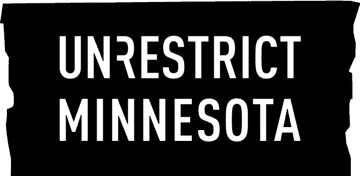As a community-supported public awareness campaign, UnRestrict Minnesota is driven by the solidarity and leadership of its community partners. Together, these advocates, health care providers, lawyers, union members, artists, and concerned citizens are advancing every Minnesotan’s right to access abortion care in our state.
SPIRAL Collective is a Minnesota-based full-spectrum reproductive justice nonprofit that provides radical, compassionate care in all pregnancy outcomes and experiences. In particular, SPIRAL is committed to eliminating barriers to abortion access by honoring bodily autonomy and collective liberation. They accomplish this by providing trauma-informed, client- and healing-centered practical abortion support, community-based education, and culture/narrative shifting practice.
Q&A
In this interview, SPIRAL shares the community models of care that guide their work, the importance of coalition in dismantling barriers to abortion care and health care access, and a future led by the abolition of harmful systems and the radical imagining of something new.
Could you tell us a little bit about your work?
SPIRAL Collective supports people in reproductive care, abortion, and loss. We provide direct service support around abortion care, and also offer community referrals and resource sharing for the full spectrum of care. We do this by providing rides to and from abortion appointments, supporting folks in scheduling their appointments, providing after-care kits with things that are nice to have around for the next few days after an abortion, and offering Plan B and pregnancy tests for drop-off or pick-up.
We also offer emotional support through our volunteer doulas, who also provide transportation support. Folks can either have a doula with them at the appointment, or in the days after to check in—and we also offer that support over the phone or other free text messaging or video calls. Throughout the pandemic, we’ve really expanded the ways we provide our abortion doula services, and we’ve carried that on continually as the pandemic has become a part of everyday life. SPIRAL also does education and narrative-shifting work, and offers workshops, skillshares, and trainings. Due to our capacity, we primarily focus on direct service support—but through UnRestrict Minnesota, we do some advocacy work as well.
Why is this work important to take on in Minnesota?
In Minnesota, there are so many barriers to accessing something that is so simple, safe, and regular. Abortions are a part of life. Everyone gets abortions. It’s so important for people to have access to the care they need. And we provide that service. The government should be doing it, but here we are.
This state is in such a unique position because we’re also known as a hub for great health care. People travel from out of state to receive care in Minnesota because it’s been deemed some of the best in the country. But there are such great disparities, particularly in terms of race, when we look at who is able to receive that care. People travel to receive care in Minnesota and yet so many Minnesotans are never able to receive this care.
And even for people traveling from out of state to receive this care, sometimes they get here—and then what? It’s cold! Cold in so many different ways. SPIRAL doesn’t move like that. Even if there’s not a volunteer available, we will find a Lyft, find an Uber, find a private taxicab to get people where they need to be, because that’s what we said we’re going to be committed to. And that’s why we exist: to bridge the gap between what’s available in our state, and what is truly accessible.
Why did you join the UnRestrict Minnesota coalition?
Because it’s important work. It’s work that can be really hard to have capacity for when you’re on the ground and doing direct support. Something that’s been really beautiful about joining the UnRestrict Minnesota coalition is that when we first joined, we were really honest about our capacity—and we’re still able to be a part of the coalition, with that understanding.
It’s also cool to see how one thing pours into the other in this work as folks are brought together. Even though SPIRAL doesn’t have the capacity to participate in all of the different ways available to us, when we do show up and show out, we contribute our experiences and perspectives.
For example, we spent years ensuring that the youth who we serve would have support during judicial bypass appointments. We sent so many emails to our volunteers to see if anybody was able to accompany a minor to their appointment. We fought for minors to be able to see judges virtually, so they wouldn’t have to sit in that building. And then in August [of 2022], with the decision in Doe v. Minnesota, we didn’t have to do that anymore.
Knowing that we supported—and are supporting—an initiative that made it so that minors don’t have to go in front of a judge and get scrutinized in order to make a healthcare decision that is so powerful and impactful feels really, really good. We have been able to lend our voice alongside UnRestrict coalition partners to let politicians and legislators know what this looks like on the ground. Being able to lend our voice and to see the fruits of that labor has been beautiful.
What does achieving full reproductive justice in Minnesota mean to you?
Reproductive justice means livable wages, accessible transportation, fresh food, clean water, housing for everyone, and support for people when they are pregnant, before they get pregnant, and after they are pregnant. It also means abolition, in the whole encompassing sense. More than the police, more than the medical industrial complex, more than capitalism.
And if you contextualize it in this moment or in our lifetime, that means access. In this harm reduction model, as we work towards abolishing harmful systems and tending to something new, what would it look like to have all of these barriers within this system be alleviated, and for people to have access to full reproductive care without having to question anything or endanger their safety?
There are community models that show us how to hold that with care, in these really harmful places and spaces. And after everything is said and done, after we win everything and burn everything down, SPIRAL will still be here.
How can people get engaged with your work?
Follow us on Instagram for training and volunteer opportunities, and donate to the work. We would also offer a gentle reminder that everyone gets abortions, not just women. All of us get abortion care. And as people engage with—and advocate for—abortion access, it’s important to honor this in the language that we use, the legislation that we fight for, the community models that we build, and the care that we provide.


